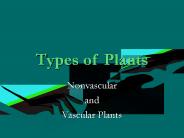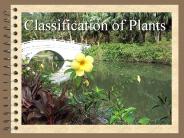Mosses PowerPoint PPT Presentations
All Time
Recommended
Mosses. Bryophytes. Mosses are Bryophytes, nonvascular plants that grow only in moist environments. A moss attaches to the ground by small rhizoids (RY zoydz) ...
| PowerPoint PPT presentation | free to view
Mitosis. Fertilization. Mitosis. Mosses. Ferns. Conifers and all Flowering Plants ... increases girth secondary growth. Cambium = layer that is dividing and ...
| PowerPoint PPT presentation | free to view
One group evolved into the phylum Bryophyta and the other into phylum tracheophytes. ... needed a different way to reproduce without the new plant drying out. ...
| PowerPoint PPT presentation | free to view
Moss protonema on peat pellet. Phylum Bryophyta - the mosses. Moss protonemata on agar ... Capsules of various shapes, some with calyptras in place. calyptra ...
| PowerPoint PPT presentation | free to view
Usually live in moist, cool environments ... Grow in dense carpets or tufts. See page 595 for examples of mosses. Liverworts. Small ...
| PowerPoint PPT presentation | free to view
Devonian plant community. Devonian plant community found at Rhynie, in Scotland. ... Photo courtesy of Scott Ridges. Tree ferns ...
| PowerPoint PPT presentation | free to download
... of provenance seed for seral species recommended for revegetation may be ... Hydroseeding with seral native woody plants has been shown to be feasible ...
| PowerPoint PPT presentation | free to view
The Solway Mosses Rehabilitation of lagg fen
| PowerPoint PPT presentation | free to view
Tree rings, mosses, and other plant macrofossils from a lateglacial terrestrial assemblage, Coastal
| PowerPoint PPT presentation | free to download
Liverworts Mosses Seedless Vascular Plants Club mosses Horsetails Ferns Bryophytes Liverworts Mosses Seedless Vascular Plants Club mosses Horsetails Ferns * *
| PowerPoint PPT presentation | free to view
Biology Chapter 21/22 Vascular Plants Vascular Plants Have vascular tissues Longer sporophyte stage Vascular Plants Club Mosses Similar to non-vascular mosses Have ...
| PowerPoint PPT presentation | free to download
Nonvascular & Simple Vascular Plants Mosses to Ferns * * * * * * * * * * * * * * * * * * * * * * * * * * * * * * * * * * * * * * * Club Moss Sporophylls (spore cases ...
| PowerPoint PPT presentation | free to download
Forests of mosses and ferns began to disappear. Mosses evolved vascular tissue ... Fern. Ponderosa pine. Which term below is least closely related to the others? 0. of ...
| PowerPoint PPT presentation | free to view
... Bryophyta (mosses), Pteridophyta (ferns), Coniferophyta (conifers, like pine trees), Angiospermophyta (angiosperms, like flowering plants) Bryophyte ...
| PowerPoint PPT presentation | free to download
CO 20 Outline Introduction Phylum Hepaticophyta - Liverworts Leafy Liverworts Phylum Anthocerophyta - Hornworts Phylum Bryophyta - Mosses Introduction About 23,000 ...
| PowerPoint PPT presentation | free to download
Anthophyta. Division Bryophyta 'Mosses,' 'liverworts,' 'hornworts' Moist terrestrial ... Division Anthophyta 'Flowering plants' Particularly successful in dry habitats ...
| PowerPoint PPT presentation | free to view
Tundra vegetation: mosses, sedges, snow lichen, arctic meadow grass ... Similar composition to Arctic Tundra. No permafrost, better drainage ...
| PowerPoint PPT presentation | free to download
... mosses Liverworts Hornworts Moss Fig. 29-9a Thallus Gametophore of female gametophyte Marchantia polymorpha, a thalloid liverwort Marchantia sporophyte ...
| PowerPoint PPT presentation | free to view
Plants Classifying Plants: 2 Main Groups of Plants: A. Nonvascular: have no vessels, no roots, no stems or leaves. Examples: Mosses & Liverworts
| PowerPoint PPT presentation | free to view
Borders Arctic Ocean across N. American & Russia ET climate grasses, shrubs, ... Tundra vegetation: mosses, sedges, snow lichen, arctic meadow grass ...
| PowerPoint PPT presentation | free to download
Classification of Plants Plant Kingdom Flowering Plants Non-flowering Plants . 3 groups Ferns Mosses Conifers Non - flowering Plants Do NOT produce flowers Conifers ...
| PowerPoint PPT presentation | free to view
Types of Plants Nonvascular and Vascular Plants Non-Vascular Plants Example: Mosses Characteristics: No vascular tissue (system of tubes to transport water ...
| PowerPoint PPT presentation | free to download
Plants Chapters 22-25 Flowering plants Cone-bearing plants Ferns and their relatives Flowers; Seeds Enclosed in Fruit Mosses and their relatives *FYI: GREEN ALGAE is ...
| PowerPoint PPT presentation | free to download
Week 5 lab: Bryo-f*cking-phytes : Liverworts - Marchantia - Riccia - Porella Hornworts - Anthoceros Mosses - Mnium - Polytrichum - Assorted Fresh Material
| PowerPoint PPT presentation | free to view
Classification of Plants ... flowering Plants Do NOT produce flowers A plant can be divided into 3 parts Examples of Mosses spores Spore-producing capsule .No true ...
| PowerPoint PPT presentation | free to download
KEY CONCEPT Plants can be classified into nine phyla. Mosses and their relatives are seedless nonvascular plants. Nonvascular plants grow close to the ground to ...
| PowerPoint PPT presentation | free to download
Communities & Biomes. Ch3 Guide. Biotic & Abiotic Factors. Biotic = Living organisms ... Annual flowers. Mosses. Climax Community: final set of organisms ...
| PowerPoint PPT presentation | free to view
0 Land Plants fall into two major groups Non vascular Vascular Non-Vascular Plants Lack vascular tissue Very small Known as the bryophytes The Bryophytes Mosses True ...
| PowerPoint PPT presentation | free to download
A) flowering plants B) fungi C) bacteria D) mosses E) don t care, where are the snacks? Bryophytes- Chapter 16 True or false. Bryophytes are plants.
| PowerPoint PPT presentation | free to download
systems of classification classification of plants algae bryophytes mosses pteridophytes gymnosperms angiosperms plant life cycles & alternation of generations ...
| PowerPoint PPT presentation | free to download
Fig. 17-0c Diversity of plant life Simple mosses Charophytes (algae) Extinct seedless plants (origin of fossil fuels) Dry land adaptations * * Fig. 17-1ca Flagellated ...
| PowerPoint PPT presentation | free to view
Carboniferous. Devonian. Silurian. Ordovician. Cambrian. Paleozoic. Cretaceous. Jurassic ... 2. Mosses most closely related to vascular plants. I. B. 3. ...
| PowerPoint PPT presentation | free to view
Ecological Succession Examples of Changing Ecosystems A forest could have been a shallow lake a thousand years ago. Mosses, shrubs, and small trees cover the concrete ...
| PowerPoint PPT presentation | free to view
Vascular plants have xylem and phloem. Seedless Vascular Plants. Ferns, Horsetails club mosses ... an efficient vascular system (xylem and phloem) ...
| PowerPoint PPT presentation | free to view
Whisk Ferns. Lycophyta. Club Mosses. Pterophyta. Ferns. Sphenophyta. Horsetails ... Whisk Ferns. Free-living sporophyte and gametophyte. No leaves or roots ...
| PowerPoint PPT presentation | free to view
Mosses: have no true roots, only structures similar to root hairs ... Palisade mesophyll consists of densely packed cylindrical cells with many chloroplast. ...
| PowerPoint PPT presentation | free to view
Anthoceros is an example of a true moss (Phylum Bryophyta). Hornwort gametophytes are thalloid. Bryophyta- mosses Sporophytes with stomata.
| PowerPoint PPT presentation | free to download
... (small bundles of cells that bounce out of cups when hit by ... Division Lycophyta - club mosses. Division Sphenophyta - horsetails. Division ... Club ...
| PowerPoint PPT presentation | free to view
Chamoi Marmot Snow vole Bear The Mountains have a diverse variety of plants. They are home to more than 1,000 species of vascular plants, about 450 mosses, 200 ...
| PowerPoint PPT presentation | free to view
How Did Plants Evolve? Scientists believe ... These early plants were similar to today's mosses (shown through fossil evidence) ... Stinking Corpse Lily p 591 ...
| PowerPoint PPT presentation | free to view
Chapter 29 and 30: Plants Objectives -Understand that land plants evolved from green algae-Mosses and other nonvascular plants have life cycles dominated by gametophytes
| PowerPoint PPT presentation | free to download
Bare. Rock. Lichens. Soil depth and. richness. Climate. Time ... Bare. Rock. Lichens. Mosses. Soil depth and. richness. Climate. Annual grasses and forbs ...
| PowerPoint PPT presentation | free to view
Plant Unit Interactive Quiz By Michelle A. O Malley 6th Grade Science League Academy Forward Question 53 Nonvascular seedless plants mosses reproduce with only ...
| PowerPoint PPT presentation | free to view
Lesson Overview 4.4 Biomes TUNDRA Biotic Factors Plant Life By hugging the ground, mosses and other low-growing plants avoid damage from frequent strong winds.
| PowerPoint PPT presentation | free to view
Arctic fox. Musk ox. Seals. Polar Bears. Tundra. Plants. Mosses. Lichens. Wide shallow roots ... North of the Arctic Circle. Northern Europe. North America ...
| PowerPoint PPT presentation | free to download
'Successional' or 'seral' community: undergoing successional change ' ... lichens & mosses on rocks start making soil airborne seeds germinate in sand/ash ...
| PowerPoint PPT presentation | free to view
About the Tundra Species Diversity About 1700 types of plants in the arctic tundra Vegetation: Grasses, mosses, lichens, sedges, shrubs, trees include birches and ...
| PowerPoint PPT presentation | free to view
Bryophytes Mosses and their relatives Chapter 22.2 Bryophytes Nonvascular plants Rely on water for reproduction No vascular tissue Uses osmosis to transport Limits ...
| PowerPoint PPT presentation | free to view
2. Mosses most closely related to vascular plants. I. B. 3. ... Leafy (Fig. 18-16) Thallose (Fig. 18-15a) B. Differences. 2. Asexual reproduction - gemmae cups ...
| PowerPoint PPT presentation | free to view
Life Cycle of a Moss In mosses, the 'leafy' green gametophytes are larger than ... The thin, green, heart-shaped gametophytes produce both sperm and eggs. ...
| PowerPoint PPT presentation | free to view
Tissues = groups of similar cells that perform ... Have no roots, no flowers ... Mosses are pioneer plants like lichens, meaning they are the first to grow in ...
| PowerPoint PPT presentation | free to view
Non-flowering plants are subdivided into algae, fungi, mosses, ferns and gymnosperms ... (woody) with roots, stems and needle-shaped leaves but no real flowers. ...
| PowerPoint PPT presentation | free to view
Includes hill-assist tram from: Marine Research Center to. The Armory to ... Hardy native plants (fescue grasses, sedums and mosses; requiring little soil ...
| PowerPoint PPT presentation | free to view
Flowers. seeds. PLANTS. PRIMITIVE PLANTS. MOSSES. Small, no true ... Flowering plants. Most numerous type of plants. Divided into two classes. Monocots. Corn ...
| PowerPoint PPT presentation | free to view
Caribou, wolfs, and polar bears are some of the larger mammals. Landscape and Plants ... Mosses, sedges, and lichens are common. Few trees grow in the tundra ...
| PowerPoint PPT presentation | free to view
























































